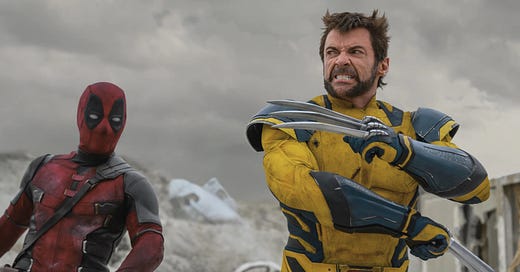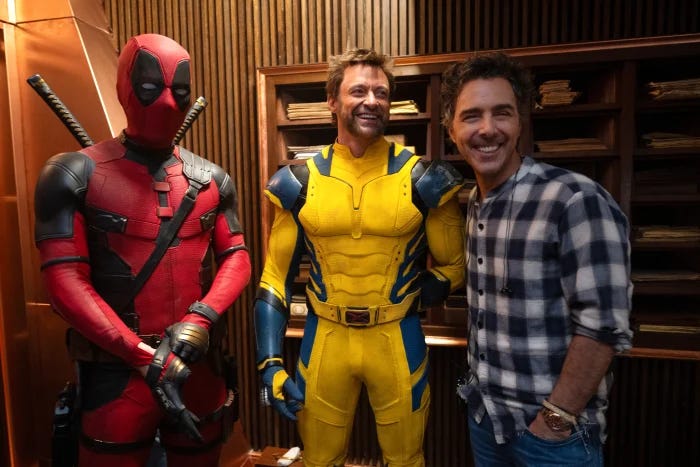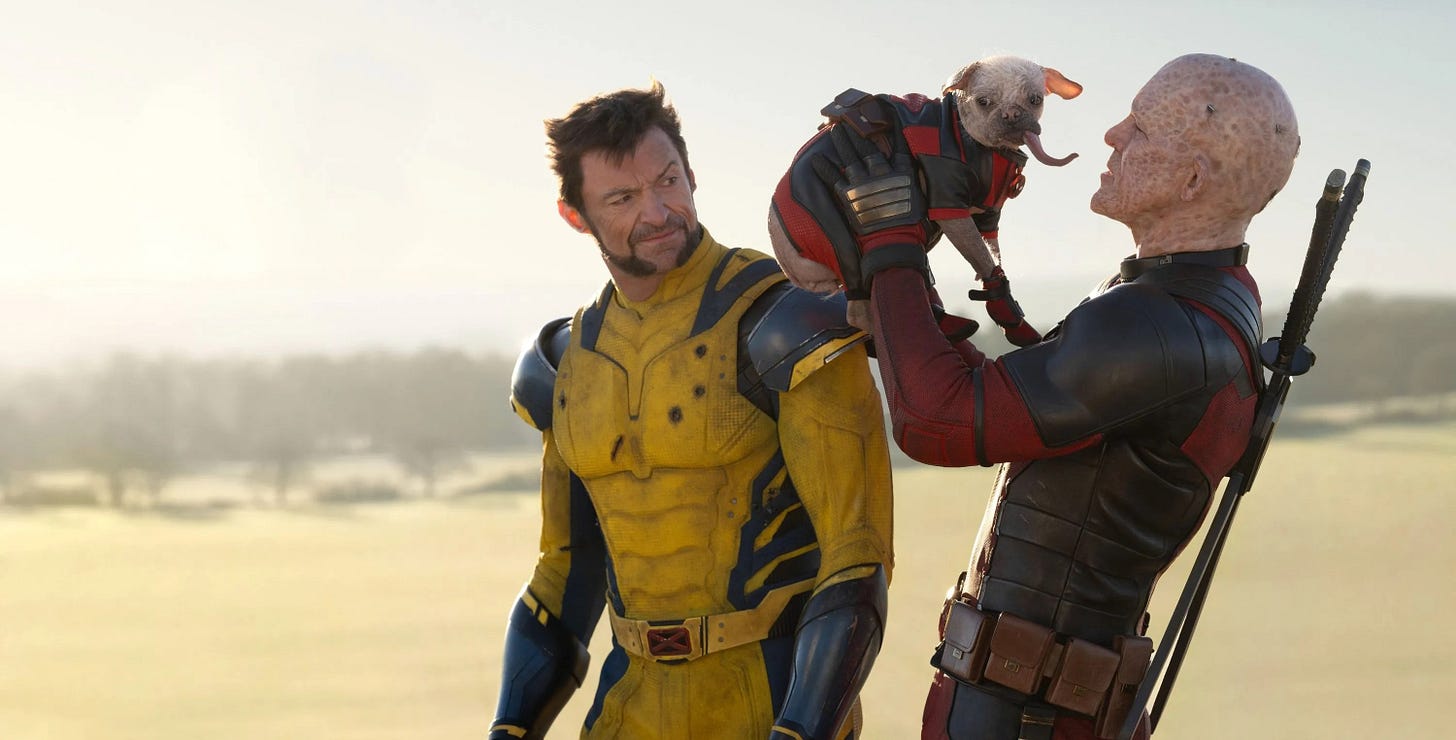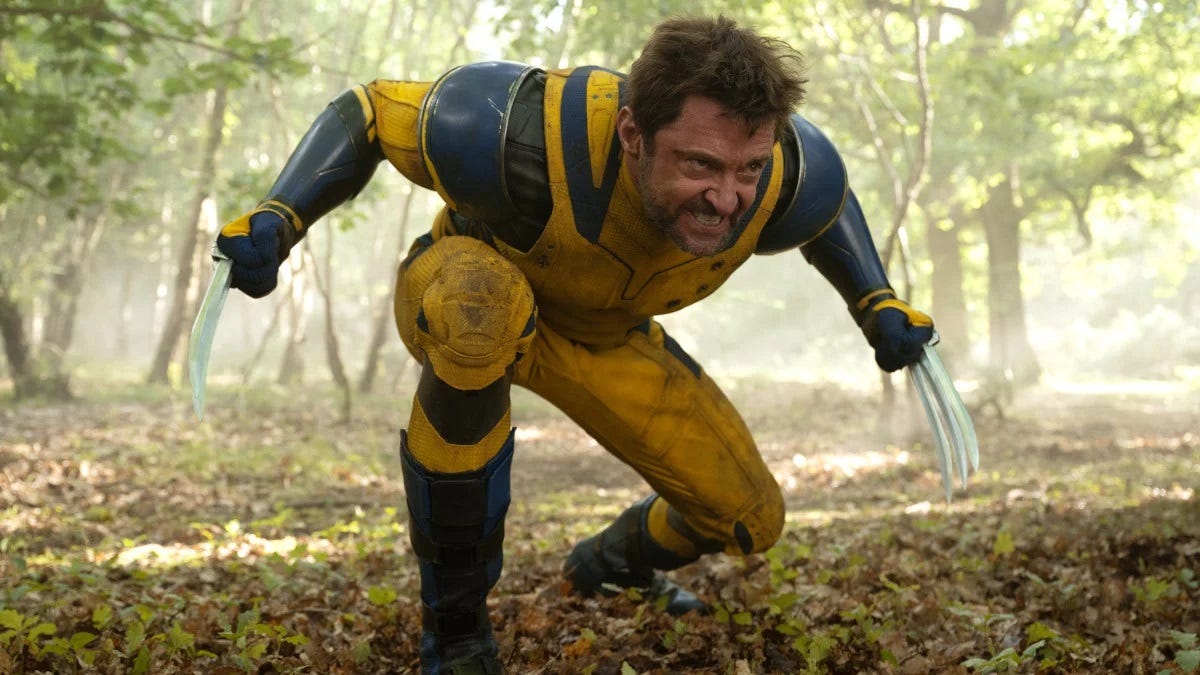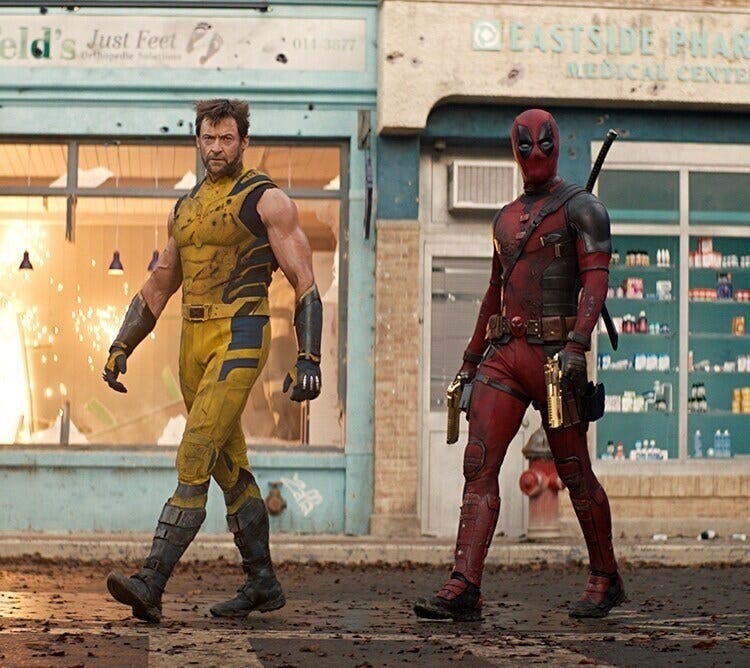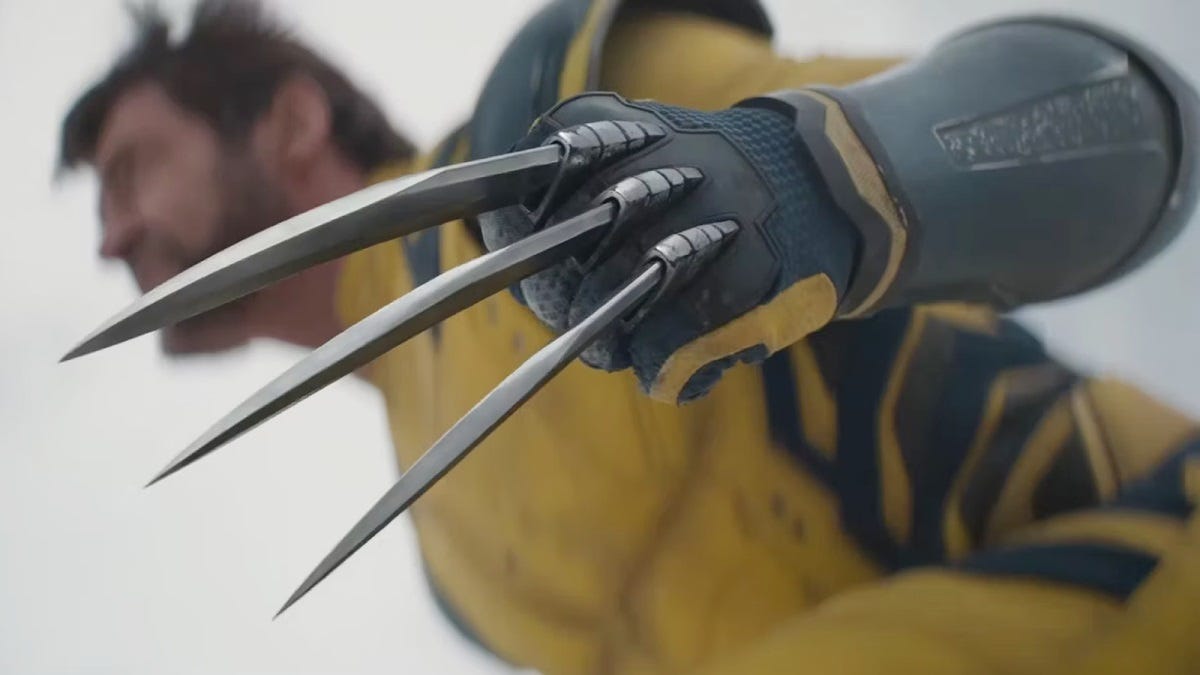The Clown and the Claws: Hugh, Ryan and Levy on 'Deadpool & Wolverine'
Ryan Reynolds, Hugh Jackman and Shawn Levy on redefining superhero cinema with humor, heart, and a perfectly chaotic bromance.
Unless you’ve been hiding under a adamantium rock (ouch!), you’ve no doubt heard about the legendary, utterly ridiculous, yet oh-so-lovable “feud” between Ryan Reynolds and Hugh Jackman. It all began back in 2008 on the set of X-Men Origins: Wolverine, the franchise’s hilariously awkward first crack at bringing Deadpool to the screen. (Spoiler alert: they sewed his mouth shut — neither Deadpool nor Ryan has forgiven them for that one.)
Since then, Reynolds and Jackman have turned their playful sparring into an art form, flinging banter and jabs across social media. Fans — shouting conspiracy theories into the void of nerdy YouTube channels — have dissected every quip and meme, chanting, “When will these two finally meet? Like, properly meet! For realz?!”
In the Holy Geek Scriptures of 2024 AD, the prophecy was fulfilled—Wolverine & Deadpool descended like a bizarrely bonkers Second Coming of Marvel Jesus, saving us from mediocre post-Endgame superhero flicks with razor-sharp claws, rapid-fire sarcasm, and enough cameos to make Stan Lee smile from the great comic shop in the sky.
Hallelujah, the chimichangas are blessed!
As a media journalist, I was touched by Marvel Jesus (no, not like that!) last month when I got to meet — via Zoom, of course — the guys behind all this glorious madness. What was supposed to be a typical press conference turned into something much more last-minute, as Ryan Reynolds, Hugh Jackman, and director Shawn Levy weren’t where they were supposed to be — why am I not surprised? So, the whole thing pivoted into a more intimate Zoom session exclusively for us Golden Globe voters.
Disney hadn’t managed to mobilize a traditional moderator, so it was just us slightly star-struck journalists and the three guys spilling the secrets behind this year’s masterclass in superhero mayhem that is Deadpool & Wolverine.
So, get your special sock out, nerds! Here’s Ryan Reynolds, Hugh Jackman, and Shawn Levy to talk to you about Deadpool & Wolverine. Maximum effort!
As we log into the Zoom conversation, we’re greeted by the trio, more or less ready to take questions from the gathered journalists. Well, Hugh seems prepared, at least — calm and collected, the consummate professional. Meanwhile, Ryan and Shawn were deep in a whispered conversation about what sounded like the business potential of porcelain tableware. It takes a moment before they realize we’re live.
Superhero Alchemy
Shawn Levy described the creative process behind Deadpool & Wolverine: “Alchemy is what happens when you bring together three distinct energies,” he explained. “Deadpool’s irreverence, Wolverine’s broodiness, and the humanity at the core of the story.” Apparently, mixing chaos, angst, and feels in just the right combination creates cinematic gold — or, as Shawn puts it, something “affirming and joyous.”
Ryan, unable to resist chiming in, highlighted how scarcity and surprise were the film’s secret weapons (insert your own Monty Python joke here). “Deadpool works best with scarcity and surprise — two things modern Hollywood doesn’t love because they don’t always mean instant money,” he said, flashing his award-winning grin. But playing the long game worked, and calculated scarcity turned anticipation into a superpower, making the movie feel fresh and significant — especially compared to certain other recent installments from the Marvel franchise.
The Marvel GOAT himself chimed in, confessing that he initially thought there was nothing left to mine from his adamantium-clad antihero. “This script found a whole new vault of depth for Wolverine,” he admitted, giving Levy and Reynolds credit for writing “the best script I’ve ever had for this character.” Coming from someone who’s played Logan nine times, that’s saying something.
The Tale of Captain Banana
There really is no denying it: Deadpool is a clown, and Ryan Reynolds fully leans into that. Breaking down the Merc with a Mouth’s distinctive humor, Reynolds shared: “Deadpool isn’t macho. His physicality is a dance — a mixture of comedy and expression. It’s clown work, not action-hero posturing.” Inspired by icons like Buster Keaton and Charlie Chaplin, Reynolds has crafted a character whose humor is equal parts carefully choreographed and gleefully unpredictable.
Hugh Jackman, meanwhile, steps into new territory with Wolverine’s long-awaited yellow suit. “The yellow suit wasn’t about fan service alone—it became a symbol of his penance and shame, making it meaningful,” Jackman explained. The reveal of the suit not only fulfilled a fan dream but added profound emotional weight to Wolverine’s journey.
Creating the suit, however, was no easy feat. Shawn Levy described the painstaking process: “Once we had the idea, which Ryan and then Kevin Feige instantly embraced, it was at least six months of first drawing the suit, redrawing it, throwing out drafts. Then you start building it. A big yellow suit is trickier than you might imagine.”
Early versions of the costume, as Levy revealed, were far from camera-ready. “We have pictures that we've never shared, yet, of the earliest fittings where it's too Captain Banana. It's too vibrantly neon day glow. And so we just would iterate and iterate and iterate.” Levy credited Marvel’s expertise for perfecting the final design: “They’re artisans and costume designers. And then the engineers who figure out how to make it in real life. It took months of failure until we got it just right.”
Levy also highlighted the storytelling decisions surrounding the suit’s iconic mask. “The decision to not deploy the mask too early, to make the story earn the mask, was deliberate,” he said, emphasizing the importance of giving the moment a dramatic payoff.
Love in the Dark Age of Streaming
Everywhere you turn, it’s another soulless, algorithm-driven binge session. But then, like a massive, chimichanga-fueled wrecking ball, Deadpool & Wolverine smashed into theaters (and our hearts) this summer. It racked up some serious bragging rights: the 20th-highest-grossing film of all time, the highest-grossing R-rated film ever, and the second-highest-grossing movie of 2024. I couldn’t be bothered to find the sources, but check Wikipedia (aka the Bible of bored office workers everywhere).
Ryan Reynolds championed the big-screen experience in a world increasingly dominated by streaming. “You don’t just see a movie; you plan the night, discuss it afterward—it sticks with you,” he said, reflecting on the enduring magic of going to the theater. Expanding on the point, he described it as “collective effervescence”—a term that captures the unique energy of a shared audience experience. “It’s almost like a drug. It’s an amazing feeling that you carry with you afterward,” he explained. Reynolds also highlighted how theatrical releases demand emotional investment: “You get a babysitter, you pay for parking, you sit for two hours with these people. What just happened was emotional investment.”
Director Shawn Levy echoed these sentiments, adding that the team felt a responsibility to create something worthy of the big-screen format. “We wanted to honor the pact with audiences - to make it worth their while to choose the theater over their couch,” he said. Levy also pointed to the movie’s emotional depth as a key factor in its global success. “This movie resonated globally because it wasn’t just spectacle — it was aspirational, escapist, and had thematic weight that sticks with people.” Translation: it made you laugh, cry, and cheer while devouring overpriced popcorn from awkwardly shaped popcorn buckets.
Hugh Jackman, the undisputed—and irreplaceable—adamantium-clawed king of emotional gravitas, shared how deeply the audience’s reactions impacted him. “I’ve never received so many audience reaction videos. Watching people worldwide connect to this film reaffirmed why we make movies,” he said. And if Wolverine himself gets emotional over fan videos, you know it’s something special.
More with Less
In an industry often guilty of making less with more (here’s looking at you, bloated blockbusters that shall remain nameless), Deadpool & Wolverine cost only a fraction of what other Marvel films often do. Produced with a surprisingly small budget for a film in its genre, the team embraced limitations as a creative advantage. “Constraint, not a blank check, fuels creativity,” director Shawn Levy explained. Ryan Reynolds chimed in, “Constraint is what makes magic. Having too much time and too much money can murder creativity. We love that we got to make one of the less expensive Marvel movies ever. Yet, it’s the fifth biggest one of all time — that’s a badge of honor for us in so many ways.”
This ethos wasn’t just a behind-the-scenes mantra; it shaped every part of the production. Levy noted how the smaller budget tightened the storytelling: “Every sequence had to advance the story. It’s about blending brutality and beauty.” Reynolds credited Marvel and Disney for giving them the creative trust to make it all work: “They trusted us to land a jumbo jet on a dime and make a movie responsibly, collaboratively, and on budget.”
Deadpool & Wolverine proves that doing more with less isn’t just possible—it’s the smarter play. Maybe the real trick isn’t bigger budgets, but better ideas.
Easter Eggs. Easter Eggs Everwhere…
Humor has always been at the heart of Deadpool’s character, and this film leans into that legacy. Ryan Reynolds opened up about the unique challenge of writing the dialogue, “One of the scariest things I’ve ever done is writing dialogue for Wolverine,” he admitted. “Comedy and drama share this incredible reliance on tension — they’re more alike than people think. Comedy works best when there’s a strong emotional core. It allows you to defy expectations over and over again in a movie like this.” He also credited Hugh Jackman so much to Wolverine’s character, noting, “What Hugh brought to the table was a kind of gravitas and a kind of willingness to stretch and grow this character in ways that might’ve felt scary to others — especially Wolverine obsessives.”
Improvisation played a key role in maintaining the film’s sharp humor, but Reynolds approached it with precision rather than spontaneity. “Improvisation on set isn’t about chaos,” he explained. “I write five, six, sometimes seven alternate lines for every piece in the movie, not just for Deadpool but for every character. Sometimes those alts aren’t even jokes—they’re dramatic lines. Once actors get their intended take out of the way, there’s a real willingness to play around. That’s what our job is: a big-ass sandbox financed by capitalism.”
The film is also brimming with Easter eggs that reward fans for paying close attention. One example is Wolverine’s Les Misérables prisoner number—24601—etched into his adamantium skeleton. “Social media can often be a toxic space,” director Shawn Levy said, “but seeing fans uncover details like these is one of the joys of making these movies.” Reynolds added, “There are probably dozens of Easter eggs that haven’t been discovered yet. Part of the reason these films take so long to make is that they’re so detailed. Once you think you have it perfect, you have to make it 20% better.”
This dedication to detail is emblematic of the team’s commitment to balancing humor, drama, and fan service. “It’s hard,” Reynolds admitted. “But I love that process, and I love that Marvel and Disney trusted us to take that time. The lazy story would be that we fought every day, but the truth is, they let us make the film we envisioned.”
Old Man Logan
As the dust settles from the whirlwind success of Deadpool & Wolverine, one thing seems certain: Despite earlier reports of Logan’s demise, Hugh Jackman’s days as Wolverine are far from over. As for how long Hugh will play the role, his answer was clear: “Til I’m 90.”
Given the film’s record-breaking reception, it’s hard not to imagine Disney keeping Logan’s claws firmly planted in cinema for years to come. Whether he’s fighting Deadpool, alien invaders, or arthritis, Wolverine at 90 sounds like a blockbuster waiting to happen. And let’s face it—Jackman would still find a way to make it iconic.

